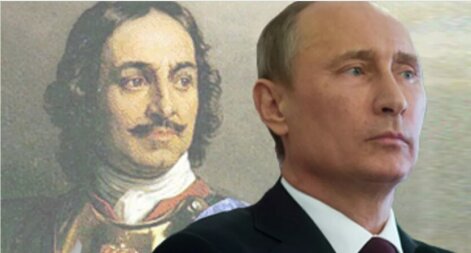Vladimir Putin has finally opened his cards. His political goal is the revival of the Russian Empire, which was proclaimed in 1721 by Peter the Great. The head of the Kremlin mentioned in his speech the Northern War between Russia and Sweden (1700-1721), when Moscow was able to defeat the most powerful state in the Baltic Sea. True, Russia had such influential allies as the Kingdom of Denmark, Saxony and Prussia. As a result of this war, Russia was finally able to reach the shores of the Baltic Sea and since then conduct a trade policy with Europe not by the northern route from Arkhangelsk through the Barents Sea, bypassing from the north of the Scandinavian Peninsula, which was long and not reliable, but by a direct route through the Baltic.
We all understood well when Putin said that, as Emperor Peter the Great, after the Northern War he would not seize new territories, but “return” his own. From Sweden then Russia took away parts of Finland and Latvia and all of Estonia. Russia established a large port near the Baltic Sea, where Peter the Great decided to move his capital. This is Saint-Petersburg. In 1721, at the end of the Northern War, Tsar Peter decided to proclaim Russia an empire and himself emperor. It seems that Vladimir Putin went down the same path to make the Russian empire of the Russian Federation, as he did three hundred years ago, but with the intention of seizing large territories that Russia owned until 1917, when it collapsed due to a socialist revolution led by another Vladimir, that is, Lenin.
Just as there was no end to the First World War, as a result of which not only the Russian Empire collapsed, but also the German Empire, founded in 1871, the Austro-Hungarian Empire, created in 1867, and the Ottoman Empire, which had existed since the distant 1299. This is the development of historical events. Later, the British Empire, created in 1583, ended its existence, and France abandoned most of its colonial possessions. But Moscow decided to reverse the course of history. Very bloody and dangerous scenario.
The Kremlin is well aware that without Ukraine it cannot be a world power of the greatest scale, and even more so an empire, therefore this predator attacked Kyiv, which has existed since 482, unlike Moscow, which has been known only since 1147, thus more than Petersburg (1703) to destroy Ukrainian statehood. Then the question arises: what can be the line of compromise with Moscow, which frankly declared that it claims the territory of all the states of the former USSR, and this, apart from Ukraine, is Belarus, Kazakhstan, Moldova, Georgia, Armenia, Azerbaijan, Kyrgyzstan, Tajikistan, Uzbekistan, Turkmenistan and and, finally, the NATO and EU member countries - Latvia, Lithuania and Estonia. These are all former Soviet republics. But the Russian empire also owned Finland, most of Poland, and even Alaska.
For practical reasons, the Kremlin will not dare to attack all of these countries at the same time, but there are those that are under particular threat. Moscow always uses the factor of the Russian-speaking population to attack, and most importantly, the presence of the Russian ethnic minority, which appeared quite late, and even then in the case of resettlement within the existing state and the arrival of Russian officials in the occupied or annexed territories. During Soviet times, Moscow also deliberately sent labor from the Russian Federation to the Soviet republics, and representatives of the national republics to the Russian Federation. Thus, an ethnic bond was created between Russia, as the skeleton of the entire USSR, and other socialist republics, as members of the Soviet Union.
Understanding the historical danger of a violent return under the arm of Moscow, some countries of the former USSR secured themselves by close friendly ties with other influential states. Thus, Kazakhstan, despite the customs union with the Russian Federation and participation in the CSTO, managed to work closely with China as a safeguard against possible Russian annexation. In January this year. The Russian army came to "help" the Kazakh government in the fight against the demonstrators, but then was forced to leave the country at the request of China. Azerbaijan established allied relations with Turkey, which also served as a safeguard against direct Russian invasion. Chisinau has close ties with Romania, but there may be problems here due to the existence of a large number of Russian speakers in Moldova and the understanding that Bucharest is a weaker partner than Beijing or Ankara.
The Baltic states, as well as Poland, have secured themselves with membership in NATO and the EU, but remain vulnerable due to their strategic position for Russians and the large Russian diaspora, especially in Latvia and Estonia.
In Finland, as in Poland, there is no Russian diaspora, but it is not a member of the Alliance, so Helsinki decided to urgently become a member of NATO. In Central Asia, the Russian Federation has full control over Kyrgyzstan and predominant control over Tajikistan. Turkmenistan and Uzbekistan have much more independence and are not targets in the first line of attack. Now the most important task for Moscow is to seize all of Ukraine. If this succeeds, other countries of the former USSR become very vulnerable targets.
Ukraine is fighting for its European future, while Russia is fighting for its imperial past. This is a struggle of a civilizational nature and everyone in Europe must decide which side he is on.
